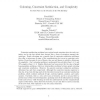174 search results - page 28 / 35 » Computer Science and Game Theory: A Brief Survey |
SIGECOM
2005
ACM
14 years 29 days ago
2005
ACM
We introduce a new class of games, congestion games with failures (CGFs), which extends the class of congestion games to allow for facility failures. In a basic CGF (BCGF) agents ...
DIMACS
1996
13 years 8 months ago
1996
in Structure'95. 14] R. Fagin. Easier ways to win logical games. In Proc. DIMACS Workshop on Descriptive Complexity and Finite Models, AMS 1997. 15] R. Fagin, L. Stockmeyer, M...
CORR
2006
Springer
13 years 7 months ago
2006
Springer
Abstract. In combinatorics, the probabilistic method is a very powerful tool to prove the existence of combinatorial objects with interesting and useful properties. Explicit constr...
CSR
2008
Springer
13 years 7 months ago
2008
Springer
Constraint satisfaction problems have enjoyed much attention since the early seventies, and in the last decade have become also a focus of attention amongst theoreticians. Graph c...
SOFSEM
2009
Springer
14 years 4 months ago
2009
Springer
Abstract. Computational mechanism design (CMD) seeks to understand how to design game forms that induce desirable outcomes in multiagent systems despite private information, self-i...


